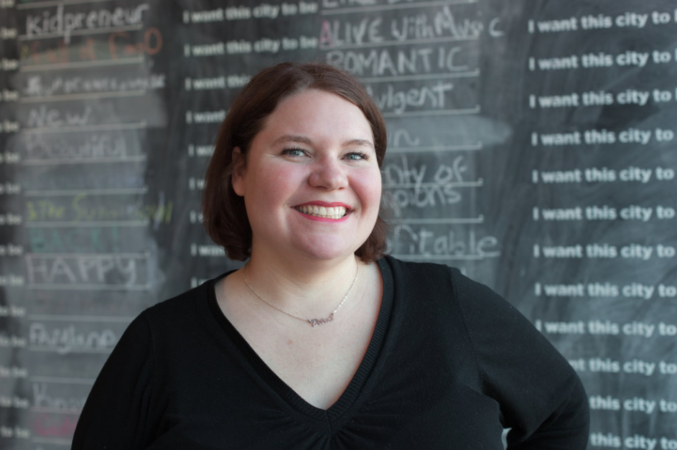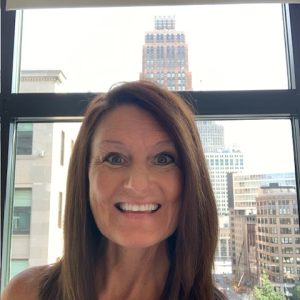A lifelong city resident who grew up on the city’s east side, Jeanette Pierce is a multifaceted and engaging storyteller with a passion for providing context around complex issues. She founded City Institute to do just that and got her start as the owner of the beloved Detroit Experience Factory.
By founding the City Institute she wants to provide a deeper understanding of Detroit to better equip residents, visitors, and stakeholders to consider building an equitable and thriving city. Since 2005, Jeanette has applied unique experiential learning through non-traditional tours to shed light for more than 150,000 locals and visitors to learn about Detroit’s assets, small businesses, historic neighborhoods, city planning & development policies, and innovative solutions to the challenges the city faces. You want to know about Detroit? You talk to Jeanette.
We talked to her about how she got her start, and her impressive career to date focused on sharing the stories of Detroit.
DII: Let’s start from the beginning – how did Detroit Experience Factory come to be?
JP: I’m so lucky. I took what I love to do and made it a job.
I am a born and raised Detroiter – I’ve never had an address that was not in Detroit. My parents played a big role in our community and were active in social justice and non-profits.
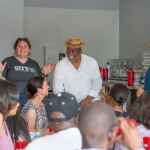
JEANETTE LEADING A LEARNING JOURNEY
I studied abroad in Spain for a time and it was a game changer. I loved walking everywhere and wanted to do it in Detroit, so I moved downtown in April of 2003 and started walking!
I thought I knew Detroit pretty well but quickly learned that there was much to learn. I’d see places I was not familiar with so I’d research them or go in and talk to the business owner. I worked to get information and answers and the history of buildings and businesses and what I learned was so interesting, that I wanted to share it. I knew that sharing the information would have a positive impact.
I found that I was often getting asked, “Why do you live Downtown? Why Detroit?” I kept thinking to myself ‘isn’t it interesting that I love my life, even when people keep telling me I shouldn’t.’ I could walk to theaters, three major sports teams venues, and over 100 bars and restaurants, I knew my neighbors … so I decided I wanted to invite people to see the city through the perspective of a woman who grew up in it and lived in it. I wanted to introduce people to businesses and residents and organizations and help people feel connected, break down barriers. That was the impetus and it went from there.
I was blown away by all that was shared in only an hour. I caught myself watching the clock because I did not want the tour to end! I was equally impressed at Jeanette’s call to action against racism at the end of the tour. I sincerely appreciated her commitment to anti-racism and asking others to join her pledge.
— Nikki Pardo, Global Alliance Solutions – Redlining, Racism, and Segregation Review
DII: You started in 2006. How did Detroit Experience Factory evolve and change throughout the years?
JP: I think a good non-profit needs to change as the community changes, to remain relevant, and we did that a few times.
In 2008 we created a welcome center on Woodward where the Nike store is today. It was $500 a month and that was $500 a month I did not have! But we made it work.
We had an opportunity to collaborate and become part of D:Hive Detroit for three years.
I quickly began to realize the importance of attracting and retaining talent. At that time if you were a Detroiter, success meant leaving and going to Chicago, New York, etc. I wanted Detroit residents who were looking to build careers, and lives, to be able to make an educated choice about Detroit, and that meant teaching them more about Detroit and the opportunities to live, work, and make an impact here.
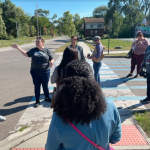
PIERCE LEADING A TOUR
So, the focus of our tours has been locals – students at Wayne State University, Michigan State, elected officials, senior groups, 2nd graders you name it. Locals can use the information. They can go back to a small business or be a more educated voter. Over 150,000 people have been on tours since 2006 and 75% live here.
In 2019 alone we did 600 tours totaling over 13,000 people.
DII: During the pandemic, you said you saw a need for a deeper understanding of Detroit. Please elaborate on this and how it led to a pivot in your business.
JP: The pandemic gave us time to pause and reflect. I always had the desire to tell the deeper stories of Detroit and provide more context, and we did that but not everyone was ready for the deeper information. You need to start with the 101 level before you get to 201 and so on.
Back in 2005 the perception of Detroit was terrible. Even residents would say there were no shops, restaurants, or bars. No one was telling the story.
Fast forward 15 years and many see Detroit as a shiny place that people are seeking out and recognizing. It’s flipped and now you have people saying, “Look at Detroit, it’s perfect.” That’s not true either, so we need to look at the challenges that do exist and start to find solutions that have an impact. There is a demand and a need for this deeper content. That’s what City Institute is about. Providing context so that residents and stakeholders are more equipped to shape an equitable city.
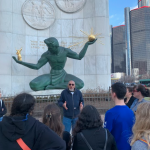
CITY INSTITUTE TOUR
We have such a rich history and so many assets. But it’s hard to work on challenges if you don’t know about the assets.
DII: Please elaborate a bit on this idea of shaping an equitable future.
JP: The more people who are informed and engaged in shaping a city’s future, the better chance of that city becoming an equitable and thriving place. We all need to understand how we got here, and what’s happening now and then work on creating the future.
Most people begin a story talking about the new business that renovated the empty building, but it’s important to learn about the racist policies that helped create the challenges we’re facing today, like the vacant buildings, before you consider what’s happening today.
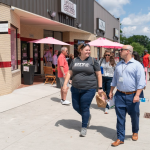
CITY INSTITUTE TOUR
Through City Institute we focus on offering Learning Journeys, which are full-day and multi-day experiences that use Detroit as a classroom to help locals and stakeholders understand how Detroit got to where it is today, connect with what’s happening now and use what they learn to move their community forward, whether that’s in Detroit or another city.
We also do private group tours around many different topics. One of our tours that is very popular is Redlining, Racism, and Segregation in Detroit. Understanding the past and how it still impacts us today is imperative to moving forward as a city and region.
This holistic approach of understanding what shaped the city, layering in what’s happening on the ground today, and giving people opportunities to engage in the future is really impactful.
DII: When did you officially launch City Institute and what are the overarching goals?
JP: We’ve actually been doing this type of work for a while but City Institute officially launched when it spun out from Detroit Experience Factory in 2021.
DII: On your website you have a quote, “To love one’s city and have a part in its advancement is the highest privilege and duty of a citizen.” Clearly, you’ve lived this – can you share more about this?
JP: I think this quote aligns with Detroit and Detroiters so well. Detroiters step up for their communities.
I was recently on a panel where we talked about, “What is a Detroiter.” Detroiters are willing to fight for their city. The saying that ‘crisis breeds opportunity’ or ‘necessity is the mother of invention’ holds water here. Detroiters have had more than their fair share of crises’ but Detroiters have a deep love for their community and so we continue to step up.
It comes from caring about where you live. From wanting to have a positive impact. This can be as small as mowing your neighbors’ lawn to large-scale city-wide recycling projects and everything in between.
There is a sense of community in Detroit that other cities just don’t have. I’m never not inspired by what Detroiters are doing. It’s important to realize that good and bad are not mutually exclusive. Assets and challenges exist simultaneously… and they do in every city. Hearing about the wins, big and small, it gives us the energy and hope needed to keep working on the challenges.
At the end of the day, I get to do what I love and have a positive impact on the city that I love. It’s not always easy but I wouldn’t have it any other way.
City Institute’s ability to combine observations of current conditions, historical facts and recent statistics with powerful anecdotes and individual stories of Detroiters was extremely valuable in helping us begin to understand the complexity and dynamism of the city of Detroit.
— Robert Stein, Harvard Loeb Fellows
As always, be sure to subscribe to our newsletter for regular updates on all things Detroit and more.


